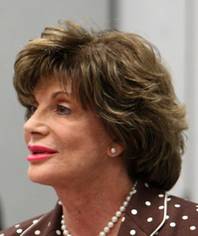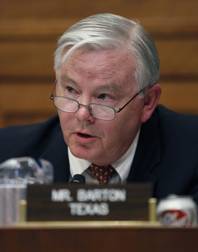Thursday, June 30, 2011 | 1:55 a.m.

Shelley Berkley

Rep. Joe Barton
Related story
Sun coverage
Sun archives
- Key conservative joins Harry Reid in effort to legalize online poker (6-10-2011)
- Senate OKs measure to give Nevada boost in online poker (5-30-2011)
- Internet poker bill advances in Nevada (5-24-2011)
- WSOP officials don’t see online poker’s demise deterring event’s momentum (5-17-2011)
- Poker websites’ actions were risky, experts say (4-29-2011)
- Caesars CEO Gary Loveman: Poker indictments present opportunity (4-26-2011)
- Internet poker company looks to Nevada for entry into U.S. (3-21-2011)
- Bill would set regulations for Internet poker (3-10-2011)
- NV considers Internet poker bill, but casinos balk (3-10-2011)
- Board OKs Caesars Entertainment ties with foreign Internet gaming company (3-9-2011)
- Online gambling is illegal, but betting sites’ logos often in Nevada casinos (7-13-2010)
- Question evolving from legalization debate: How to tax online casinos?
- Lawmakers push to regulate, tax online gaming (5-19-2010)
- With aggressive push, Internet gambling again in play (2-9-2010)
Last week, Texas Rep. Joe Barton officially unveiled the Internet poker bill gamblers across the country have been waiting for, but it’s a safe bet that the document’s going to go through some serious changes before skeptics and even some supporters think Congress will be ready to back it.
At the top of the list is Rep. Shelley Berkley, Las Vegas’ representative to the House of Representatives, who represents the district likely to see the largest boom from a legalization of online poker payment transactions.
She’s also the chief Democratic sponsor of the legislation.
While celebrating the legislation, Berkley reminded that the bill “is not perfect, and we will, in order to get it passed, have to make some changes, particularly when we talk about the wait period for those companies that have been doing business online against the spirit of the current legislation,” she said. “I suspect to reach a compromise and get this bill passed, we’re going to have to work on that.”
While the concepts behind last year’s and this year’s poker transaction authorization bill are one and the same, the two bills are not crafted alike. The changes will likely help the bill avoid some pitfalls but seem destined to create new hurdles as well.
Both seek to legalize the transactions to process monetary bets for Internet poker and include a special grant of consideration for online horse betting as well — a provision that appears designed to ingratiate the bill to Senate Republican Leader Mitch McConnell, whose support will be key to getting a bill passed. Each diverts revenues from the process to the states and eventually the federal government.
But there are important differences as well.
The ongoing litigation of three separate online gaming providers in a New York federal court has changed the climate of suspicion about the trustworthiness of online gaming operators, as well as some lawmakers’ urgency to regulate the industry.
“I think the indictments helped us,” said Rep. Barney Frank, the ranking member of the House Financial Services committee who has backed a broader Internet gaming bill but thinks Barton’s bill stands a better chance of passing.
“People will sometimes defend laws like this by pointing out that it’s not enforced...This is no longer an abstract philosophical question, it’s now an interference. The fact that people were actually getting arrested, that businesses were being interrupted, that has given some people a reason to say, ‘Yeah, you’re right, we ought to get rid of it,” he said.
That’s reflected in some of the enforcement sections of the bill.
Last year, Reid’s draft bill had a very definitive answer for those actors: after a 15-month blackout period for everybody, those previous offenders would go into an additional licensing blackout for a period of years (the number of years were never defined as the bill was never finished) as punishment.
Barton’s bill accelerates the timetable for operators new to the Internet gaming market (there’s no across-the-board 15-month blackout window to start), and then leaves it up to the states to start deciding, two years later, whether those operators who did break the law previously by processing transactions for Internet gambling on their sites should be allowed into the fold or not. The states also get to decide whether they want to opt out of the whole system.
“The timeout in Senator Reid’s is more to my — I feel more comfortable with that,” Berkley said. “Both of them do have a time-out box, but it’s structured differently and I support Senator Reid’s position....I don’t think they should be prohibited for life. There should be a price to pay. We’ll craft a piece of legislation to reflect that price.”
The legislation will have its first official procedural consideration in the House’s Energy and Commerce Committee, where Barton sits as chairman emeritus. (It’s a committee that Nevadans will be familiar with as the locus of the debates over Yucca Mountain — Berkley joked to Barton that if she could convince him of her view on that subject, they would have “an ideal relationship.” Barton, jovially grimacing, responded: “heh, heh; one thing at a time.”)
After the poker bill clears the Energy and Commerce Committee, supporters pointed out, other committees can’t arbitrarily block it on its way to the House floor.
“Under the rules of referral [to additional committees], the chairman is not in a position to block it. A vote has to come, and I’m confident we’ll have a majority,” Frank said.
That means that Rep. Spencer Bachus, chair of Financial Services, and Rep. Dave Camp, chair of Ways and Means, who last year joined with Judiciary Committee Chair Lamar Smith to express their acute disdain for legalization of online poker, would at least have to put the question to their committees. Barton says he’s gotten a “yellow light” from House leaders to aim for the floor.
But that doesn’t answer the perpetual question about what to do in the Senate, where, Barton said, “we’ve had discussions at the staff level with both Majority Leader Reid and Senator (Jon) Kyl” — but the signal they’ve been receiving there isn’t quite as clear.”
“I don’t know how to characterize it,” Barton said. “It’s more than a yellow light. But they’re not putting us on the freeway in the expedited lane.”

Join the Discussion:
Check this out for a full explanation of our conversion to the LiveFyre commenting system and instructions on how to sign up for an account.
Full comments policy